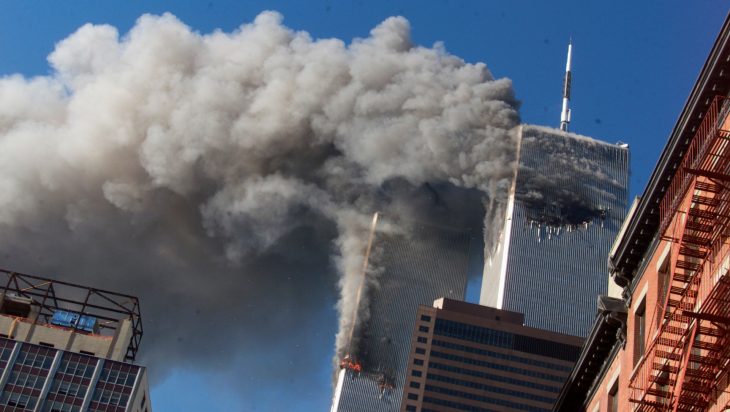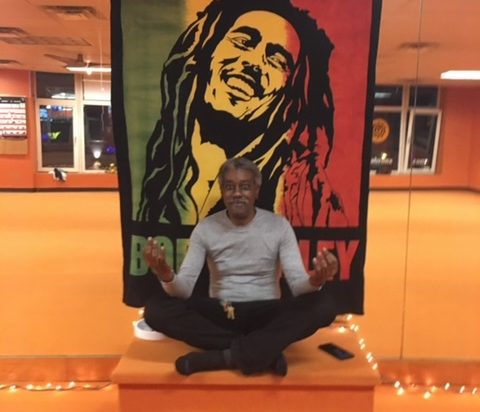Disturbing Memories Come Back with Visit to Ground Zero

20 Years Later: Black Journalists Reflect on 9/11 – NABJ Special Reports
09/10/2021Appreciating Life and Family on a Day of Tragedy
09/10/2021
By Melanie Eversley
For almost 20 years, this New Yorker managed to avoid Ground Zero. That ended one night when I took the wrong subway exit for a meeting. I found myself staring at the space where the Twin Towers once stood.
The chaos of the World Trade Center attacks all came back: The silt that covered everything and made my face burn; the wanderers with glazed expressions; the firefighters who drank silently at a bar; the cop who wept; the mother searching for a missing son; the makeshift outdoor morgue; the smoky air.
People who don’t live in a place directly hit on Sept. 11, 2001, see Ground Zero as a place of history. For me, it’s a place of disturbing memories.
I grew up in New York, returned often after I moved away, and came back to live 10 years ago. In 2001, I was a Washington correspondent for the Atlanta Journal-Constitution. I worked in the Cox Newspapers bureau near the Capitol.
I slept late on Sept. 11. I was up late the night before and was supposed to be taking a vacation day. The phone woke me. My editor told me through static to turn on the TV. “America Under Attack,” the screen said. Once I grasped what was happening, I moved into emergency mode.
I drove to work through empty streets. My usually chatty coworkers tapped mutely at computer keys. I talked by phone with the former U.S. Rep. Jack Kingston, a Savannah Republican, who said he ordered his two youngest staffers to drive home to Georgia. A Hill contact shared a rumor with me about another plane headed to the Capitol.
I volunteered to go to New York with the deceased photographer Rick McKay. I felt I had to be there. I also wanted to check on family and friends. As our train approached Manhattan from across the Hudson River, we saw the giant white cloud of smoke that poured from the site.
On the sunny, silent streets, Rick and I separated. I walked the three miles to Ground Zero, waiting with other journalists outside a makeshift barrier for someone in authority to update us. U.S. Rep. Carolyn Maloney and former U.S. Rep. Charles Rangel, both New York Democrats, exited the blocked-off area. “You don’t want to see what’s back there,” Maloney told me.
I finally reached my mother by phone. When the towers came down, she’d been at a funeral in Queens. She’d walked across a bridge to Manhattan with many other people and shared a cab home with strangers. I reached friends on a staticky phone call and learned they were OK.
I wandered, looking for people to interview. I passed the open door of a bar and saw bedraggled firefighters drinking brown liquor and beer. They told me they were from Connecticut. They said they didn’t want to talk.
I spent two weeks reporting and filing stories everyday in New York in the immediate aftermath. I checked in regularly with editor Bert Roughton, who’d covered wars during his career.
As I wandered, I thought of the gym at the World Trade Center where I worked out when I was in New York. I worried about what happened to the employees. I had a flash of a memory of drinks and appetizers at Windows on the World, the 107th-floor restaurant at the Twin Towers. I’d accidentally bitten into an ultra-hot pepper and tears rolled down my face from the heat.
A few blocks from Ground Zero, I came upon a residential plaza carpeted with fax cover sheets, memos and Post-it Notes. Some of the silt-covered papers bore the names of financial companies in the Twin Towers. I took some of the papers as a way to pay my respect to the victims.
I walked to the city morgue, where an adjacent street was curtained off for medical staff to organize remains. Fliers covered nearby lamp posts and walls. Each had a photo of a man or woman under the word “Missing” or something like that. Relatives clung to the belief that their loved ones were alive but disoriented.
I met the Khan family as they posted fliers. Their son and brother, Taimour Khan, worked at Carr Futures. Tahira Khan said she knew her son was alive because she could feel him. I tagged along as the family taped fliers around Manhattan. Tahira Khan explained she followed Sufism, a form of Islam that focuses on the inward search for God. I could feel her peace.
The NYPD directed journalists from out of town to report to police headquarters to register and receive credentials. The line stretched outside into the night. I chatted with a reporter with The Christian Broadcasting Network who asked if I wanted to pray. We sat on the curb and she prayed her heart out for everyone’s comfort. I added some lines too. I went for a coffee run and chatted with a cop at a barricade. He said he’d been working nonstop for days, went home for a nap, and his toddler son fell asleep at his feet, his little arms wrapped around his dad’s ankles. The cop broke into sobs as he described how he had to peel his son’s arms away to come back to work. I had a lot of personal conversations with strangers during that time.
About two weeks in, Bert Roughton said it was time for me and the other AJC reporters to rotate out. I argued but he insisted. An hour later I realized he was right. I watched a memorial service on TV. The camera closed in on actor Benjamin Bratt, tears streaming down his face. That random moment hit me, and I realized what I’d been covering.
After that time, I would return to New York often for terrorism meetings at City Hall. For months, you could still smell the smoke and taste the silt. On the anniversary, I always listen to the reading of the names for Taimour Khan. I would check in by phone with Tahira Khan, but after her son’s remains were identified, she stopped taking my calls. I reconnected with the Connecticut firefighters by phone. They were better able to talk about how deeply they were affected.
On that night just before the pandemic started to spread through the country, I saw the memorial site up close, I felt peace and headed to my meeting. I told a couple of police officers nearby that it was my first time there since 2001.
They understood.
Related posts
Blocks Away: A Memorial to 9/11My Artist statement:As a Black visual journalist it was rare to see others that looked like me covering the story of my lifetime on 9/11. I was in NYC on vacation from my job at The Detroit News, scheduled to fly home that morning, when I woke up to the second plane hitting the tower at full speed. I knew I needed to tell the story so I ran toward the danger. It was a natural reaction. I wanted to document the experience through the lens of a Black woman and native New Yorker. I spent days covering the tragedy from blocks away, taking time to capture images using my knowledge of the arts. I wanted to honor the people and the city of New York by spending days making pictures that documented what was going on. Through the lens of my camera, I was able to create a visual memorial.














